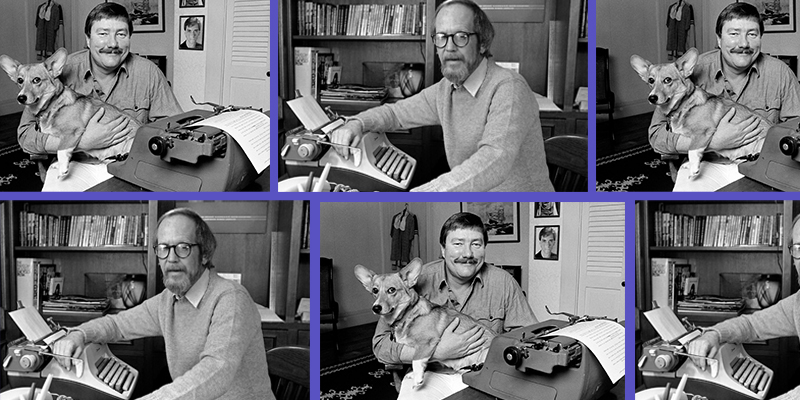Two grand masters of crime fiction, Elmore Leonard and Robert B. Parker, will never be remembered for their television writing – not when there’s so much great fiction between covers from the two of them.
But the two, whose work inspired/was adapted/was imitated in many movies and TV shows, did leave a legacy of good TV. Not surprisingly, that legacy comes principally in TV series drawn from their own work in print, the series “Justified” for Leonard and “Spenser: For Hire” for Parker.
But besides inspiring those series, each writer had a hand in a few stories and scripts – in Parker’s case, just two “Spenser: For Hire” episodes, but they’re choice ones – and those live on, like their books, for those of us who want to hear their witty dialogue and clever plots play out on our screen.
Over the decades, a lot of crime writers have been adapted for television and a few have had a hand in TV productions. I won’t even go into them all here. Suffice to say I’m pretty excited about one we haven’t seen yet, a series based on Laura Lippman’s Tess Monaghan novels, which she will co-write with another legend, Megan Abbott.
For now, though, we can content ourselves with the assorted Dennis Lehane or Robert Bloch series episodes from the past.
Plus some of the best of “Justified” and “Spenser: For Hire.”
“Justified,” the series that debuted in 2010 and ran for five seasons, is in its entirety pretty damn good and has many great characters and snappy lines. As evidenced in the second season episode “The Spoil,” when Raylan Givens (Timothy Olyphant) and frenemy Boyd Crowder (Walton Goggins) find themselves on the same side as they protect a coal company exec. Boyd asks Raylan what he can do.
“You see anyone pull a gun,” Raylan replies, “Step in front of it.”
I should note here that, barring what the writers involved might have said publicly, there’s no immediately obvious way to tell how much Leonard contributed to the finished “Justified.” That’s the nature of collaborative television writing. Indeed, the whole series feels like an Elmore Leonard story, and of course, it was based on his story “Fire in the Hole” and his characters. There’s definitely an aura of authenticity with the episodes for which Leonard gets a story or other kind of writing credit.
Parker and his TV legacy
First, Parker on the small screen: Robert B. Parker’s novels about Boston P.I. Spenser and his cool and deadly friend Hawk make up one of my favorite book series, right up there with Dennis Lehane’s Patrick and Angie books. Parker died in 2010 and left a hole in modern P.I. storytelling. When “Spenser: For Hire” began airing in 1985 – it ran for three seasons – it provided a nice fix of Spenser, Hawk, Susan Silverman, Marty Quirk and Frank Belson when we didn’t have a new Spenser novel to read. And while Robert Urich made for quite a good Spenser, was there ever better casting than Avery Brooks as Hawk?
As enjoyable as “Spenser” is, the series gave us too few opportunities to see a screenplay written by the author himself. Parker is credited with writing only two episodes. The first was “One for My Daughter,” a 1987 episode that finds Spenser and Hawk protecting a man with a gambling problem who’s in danger from the mob. The man’s teenage daughter likewise takes risks, not the least of which is her own addiction. Parker’s screenplay is a cut above every other episode of the series. The dialogue between Spenser and Hawk crackles just as it does in Parker’s novels.
Then there’s the first episode of the third and final season, “Homecoming.” Susan, played by Barbara Stock, was not part of the second season, just as Susan and Spenser had broken up in the book series. In “Homecoming,” with a teleplay by Robert H. Parker from a story by his wife, Joan Parker, Susan returns to Boston and Spenser. The episode is a good one, with Spenser and Hawk overseeing a truce between a judge and a mobster, but the scenes of Susan and Spenser reuniting (and Hawk welcoming Susan back) are the highlights, and the highlights of the highlights are the repartee between Spenser and Hawk.
And of course Hawk’s cool-as-ice demeanor toward a blustering younger-generation mobster.
“You feelin’ froggish?” Hawk tells the mob boss wannabe. “Then leap.”
Parker, often co-writing with Joan, is credited with other teleplays and there’s some Spenser represented there. And there’s some even less likely TV drama.
As Spenser, actor Joe Mantegna is good in three TV movies, which aired on A&E from 1999 to 2001. Of course, Mantegna is always good, although he’s not quite right for Spenser. Marcia Gay Harden is likewise fine as Susan Silverman. But much of the remaining casting feels off, which is probably more obvious in the wake of the “Spenser” weekly series. The first two movies didn’t get the casting of Hawk right, and I’ve yet to see the third one, “Walking Shadow,” which apparently cast beloved Ghostbuster Ernie Hudson as Hawk. I really want to see this, if only for Hudson.
There’s some snappy dialogue in “Thin Air,” but with the lesser emphasis on Hawk – at least in the first two – there’s less chance for Parker’s screenplays to get right the repartee between two of the best characters in crime fiction.
(Parker has a blink-and-you’ll-miss-him cameo in “Thin Air” as a cop asleep at his desk in a precinct house.)
Over a 10-year period beginning in 2005, CBS and later Hallmark produced nine TV movies based on Parker’s Jesse Stone series of novels. These were good, moody crime dramas featuring Tom Selleck as Parker’s troubled small-town police chief, but they could have been improved by Parker screenplays.
And then there’s a 1989 episode of “A Man Called Hawk,” a short-lived TV series spun off from “Spenser: For Hire.” The series places Hawk in Washington D.C. Parker wrote the teleplay for the episode, drawn from a story by Parker and Joan, and watching it recently. I thought it feels like an episode of a “Batman” series but with Hawk as the central character, appearing and disappearing unexpectedly, glowering and looming, carrying on cryptic conversations with cops. “I’m going to do what I have to do,” Hawk tells a police detective. Although Hawk doesn’t eschew guns like Batman, he does scoff at them in lesser hands, quickly and casually seizing a gun from a threatening hood.
Under the category of less likely: The Parkers wrote two episodes of “B.L. Stryker,” a Burt Reynolds series that was part of an “umbrella” series from 1989 to 1990. The series is standard TV for the time and meant to capitalize on Reynolds’ charisma. In the Parkers-written “High Rise” episode from 1990, besides the Parkers’ words, there’s the performance of Ricardo Montalban as the villain, and he delivers his lines with relish. Incredibly, the divine Julianne Moore plays a member of his gang and his girlfriend. Montalban comes across like a Bond villain in this “Die Hard” imitation. Or maybe a “Star Trek” villain. The episode is available online and really should be seen.
‘You mean I had four kidneys?’
While Parker’s television work is sometimes good, there’s no denying the integrity and entertainment value of “Justified,” drawn from the work of Elmore Leonard and shepherded to the small screen by writer and producer Graham Yost.
I don’t have to sing the praises of “Justified” here because I’ve already done that for CrimeReads. I will note that four episodes have writing credits by Leonard himself.
Leonard co-wrote with Yost the story for “The Moonshine War,” the second-season premiere. The episode will go down in history for introducing one of the great TV characters of all time, Mags Bennett (Margo Martindale), the mama bear of a Harlan, Kentucky family. Subtly written, Mags is the crime boss of the county and her tads – her sons – are her henchmen, at least when they’re not screwing up the family marijuana business and everything else they touch.
Creating or co-creating Mags and the Bennett clan would be enough of an accomplishment for any writer. Mags is cold-blooded but protective of a young girl (played by Kaitlyn Dever). She’s wily as she spars with Raylan Givens and other law enforcement officers and yet on the side of the angels in the aforementioned episode “The Spoil,” where she faces off against a company that wants to strip-mine their mountain.
Leonard got story credit for two “Justified” episodes in later seasons, including “Money Trap,” where he reinforces the staple of the temptations presented to U.S. Marshal Raylan Givens, played peerlessly by Timothy Olyphant. Raylan is tempted by the advances of a woman with the unlikely name of Jackie Nevada.
“That sounds like a character in a Steve McQueen movie,” Raylan notes. And that’s before he learns that Jackie Nevada’s father is named Reno.
Then there’s “Thick as Mud,” in which dimbulb criminal Dewey Crowe (played by Damon Herriman, who went on to play Charles Manson in “Once Upon a Time … in Hollywood” and “Mindhunter”) thinks his kidneys have been cut out in a motel bathtub.
Dewey, hiding in a convenience store back room, emphasizes to Raylan how desperate his situation is: He’ll die any moment with no kidneys. Raylan tells him to urinate, which would prove that his kidneys are still present, connected and working. Dewey does and is amazed.
“You mean I had four kidneys?” Dewey asks.
It’s vintage Leonard, in which a criminal has a battle of wits with himself and loses. Leonard is at his best when he writes about bad guys and good guys who occasionally step over the line between good and bad. That’s really the mission statement of “Justified.”
Leonard and Parker didn’t give us a ton of television, but what they did – Ricardo Montalban and all – is truly fine.

















